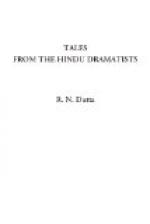Satyacharya asks, “How are the scribes?”
The Brahmans answer, “They collect the revenues by any expedient, and vigilantly inflict penalties on the wise. The Brahmans are not allowed to keep even the dust upon their bodies; the dust accumulated on their feet is claimed by the Kayeths. What can we say of this reign? The dumb alone can speak the truth, the deaf hear the law, the sons of the barren are well-behaved, the blind behold the observance of the scriptures. Our lands have been given to drunkards, and we are detained in prison for what our ancestors expended.”
Satyacharya observes, “I have heard enough. Better fortunes attend you.”
The general Samara Jambuka, the jackal of war, boasts that he can cleave a roll of butter with his falchion. He trembles from top to toe at the approach of a mosquito.
The king orders vice to be proclaimed virtue by beat of drum. All the Brahmans are perpetually banished.
PRACHANDA PANDAVA
OR
THE OFFENDED SONS OF PANDU
OR
BALA BHARATA.
Draupadi is married to the five sons of Pandu, in compliance with the command of their mother. Yudhishthira, the eldest son of Pandu, loses every thing including Draupadi at chess-play with Duryodhana, the eldest of the Kauravas. Draupadi is now dragged by the hair, almost naked, into the public assembly, an insult in revenge for which ferocious Bhima vows to slay Duhsasana, the insulter, and drink his blood, and ultimately fulfils his vow. The Pandava princes then depart to the forest.
PROBODHA CHANDRODAYA
OR
“RISE OF THE MOON OF (TRUE) KNOWLEDGE.”
Religion and the noble king Reason, accompanied by all the Virtues namely Faith, Volition, Opinion, Imagination, Contemplation, Devotion, Quietude, Friendship and others, are banished, from Benares, by the evil king Error who reigns at Benares, surrounded by his faithful adherents, the Follies and Vices namely Self-conceit, Hypocrisy, Love, Passion, Anger, Avarice and others. There is, however, a prophecy that Reason will some day be re-united with Revelation; the fruit of the union will be True Knowledge, that will destroy the reign of Error.
The struggle for this union and its consummation are followed by the final triumph of the good party.
NAGANANDA
OR
JOY OF THE SERPENTS.
Jimutavahana, a prince of the Vidyadharas, is a Buddhist. He marries Malayavati, daughter of the king of the Siddhas, a votary of the goddess Gauri, the wife of the great god Siva. When he comes to know that Garuda, the bird celebrated in mythology, is used to eat up one snake each day, he makes up his mind to offer himself to the bird as a victim, and eventually succeeds in converting Garuda to the principle of Ahimsa or abstention from slaughter; but he himself is on the point of succumbing to the wounds he has received, when, through the timely intervention of the goddess Gouri, he recovers.




